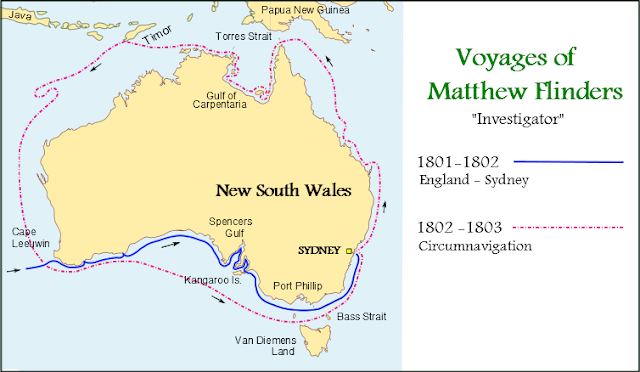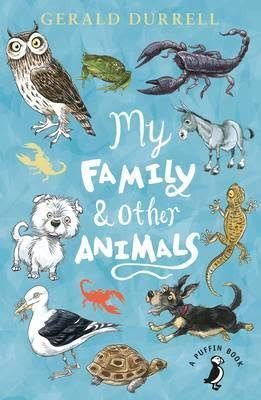'If the plan of a voyage of discovery were to be read over my grave,
I would rise up, awakened from the dead.'
Matthew Flinders (1774-1814)
My Love Must Wait is a book I've known about for years and if it had been published under a more auspicious title I might have read it long before now. The title just doesn't represent the contents well enough. Yes, it is a poignant love story and this thread is woven throughout but it is so much more than that. It is also a wonderful account of the early life and influences of Matthew Flinders, the man who circumnavigated, mapped and named Australia, the fifth continent, and it details his driving ambition, his engaging personality and his great navigational skill. It is an account of a great tragedy, where a young man's life's work was cut short, his achievements forgotten for a century. A young man who gave his all and lost everything.

In the early 1930's, Ernestine Hill's knowledge of Matthew Flinders was on par with the average Australian. Everyone knew that Bass and Flinders sailed along the coast of New South Wales in a little tub boat called Tom Thumb, that Bass discovered Bass Strait and that Flinders made other explorations that were important but vague, but that was about the extent of common knowledge.
In the 1930's, the author sailed a thousand miles in a lugger from Thursday Island to Arnhem Land with a Torres Strait Islander as skipper, and was amazed to discover that the chart Matthew Flinders made of the area in 1802 was still in use.
Poring over that chart by the light of a hurricane lamp in the evenings, and later in library research, Ernestine Hill came to know Matthew Flinders as a friend as she pieced together fragments of his life. One day she hoped to write his forgotten story, a living book, that would speak to Australians and bring this
'most exact and accomplished of the cartographers of all time, a genius in navigation' to life.
The author certainly did this.
My Love Must Wait is a superb achievement using scenes and situations created from written records: logs, journals, letters and private diaries, to present an accurate portrayal of the man, the lover, and his considerable accomplishments.
Flinders left an immense amount of detail about his work, his friends, his impressions, the surroundings he found himself in, and his associations, but it was in his passionate, poetic letters to his wife, Ann, that he revealed his heart.
Matthew and Ann had known each other from childhood, and were married in 1801. Ann had been prepared to travel to Australia with Matthew and stay with friends in Sydney while he did his explorations of the coast, but this was the era of Napoleon and Nelson, and the Admiralty had recently clamped down on women aboard ship due to Lord Nelson's indiscretions which had made the Navy a laughing stock.
Matthew was forced to choose to sail without Ann, or forfeit his voyage of discovery.
Ann was supportive of his going even though he would be away for four years and he was willing to leave her to undertake his great task. He told Sir Joseph Banks:
'I will give up the wife for the voyage of discovery.'
Pretty harsh! Although Ann was severely disappointed she made no complaint. She must have been an unusually selfless type of woman to have done this as graciously as she did. It wouldn't have been my response!
Matthew completed his work but a cruel twist of fate made him a prisoner on the Ilse-de-France (now known as Mauritius) for over six years as he was on his way back to England. By the time he returned home he was a broken man, almost destitute, and forgotten, or worse, pitied.
He had been separated from his wife for nearly ten years and was to die only four years after his return to England, a direct result of the conditions he endured in captivity. Only forty years of age, he died just a day after the book he wrote about his explorations was published, leaving behind his faithful and loving wife and an infant daughter they had named Anne.
Flinders chose to title his book 'A Voyage to Australia,' but Sir Joseph Banks changed it to 'A Voyage to Terra Australis. However, Flinders' choice was later vindicated:
Although Matthew Flinders only lived for forty years, he accomplished so much and lived through a time of great upheaval and change.
My Love Must Wait reflects
this and so the book encompasses a significant amount of history, culture and geography.
There is a lively account of Flinders' early life and influences and his developing love for the sea and exploration. We see his friendship with George Bass, a surgeon, who was to go exploring with Flinders later on; his budding relationship with Ann, his childhood friend; his father's opposition to his going to sea and his later acquiescence.
Matthew joined the Navy at a time of national fervour but he chose exploration over war and one of his first journeys was with Captain Bligh (of
Mutiny on the Bounty fame) to Terra Australis. This was a lively account of life at sea and displays Flinders' personality so well. He was a skilful communicator and showed wisdom and humour in his encounters with the Aboriginal people, once diffusing a potentially explosive situation by giving the natives haircuts.
Their return to England coincided with England's war with France and Flinders took part in what was to become known as the the
Glorious First of June, the first great naval engagement of the French Revolutionary Wars, fought between the French and the British in the Atlantic.
After this Flinders departed on a voyage to the new colony at Sydney with Captain John Hunter and while there he and Bass did their exploring in
Tom Thumb. This was a very enjoyable and interesting part of the book. It was upon his return to England after this trip that he and Ann were married.
About a quarter of the book details Flinders' stay on the Ile-de-France where he was held on house arrest and it has quite a different feel from the rest of the book, sombre and introspective with less action. His six and a half years on this island gave him much time for reflection and he was tortured with thoughts of his wife, wondering if she were still alive, and whether others such as Nicolas Baudin, the French explorer, would take credit for the work he had done.
Later when the war between England and France ended, he was released by the French and was reunited with Ann in England:
The woman covered her face with her hands.
He went forward swiftly, and put his arms about her - sombre brown against the faded blue. With cold hands he lifted her face to his.
This sober little body his lovely, laughing Ann. They kissed, and the kiss seemed formal, empty.
Then in long shivering sobs she clung to him, the helpless tears staining the shoulder of his frayed uniform coat. Haggard eyes looking out on the grey, he might gave been a man of fifty years.
All through that dreary forenoon they sat there, clasped in their joy and sorrow, now and again to find dear remembered caresses of reawakening love, telling the sad litany of their loneliness, feeling their way, as a blind man feels, back across the years.
This is a warm, lively, enjoyable, but an ultimately sad look at the life of Matthew Flinders and Ernestine Hill's writing style is lyrical and descriptive. There are so many connections with historical figures and the early days of colonial life in Australia, such a broad sweep of characters: Sir Joseph Banks, Captain William Bligh, Captain Hunter, John Macarthur (the pioneer of the Australian wool industry), Lord Nelson, and Nicholas Baudin, for example. I learnt so much about Australian History and what was happening elsewhere at the time.
The only disappointing part of this book is that it didn't contain any maps! I used the maps in a book we used in Year 4 to follow along with Flinders' journeys but there are online maps showing the places he navigated and charted.
I highly recommend this book for high school history and geography or as a biography for about ages 14 and up, even if you're not Australian, as it features worldwide events and high profile characters. Chronologically it fits well into
AmblesideOnline Year 9 (1800's) and would be enjoyed by both boys and girls. Flinders is certainly someone a young person could admire.
'All the time Matthew could spare from his nautical and mathematical studies he spent in reading discovery, "peering in maps and charts", chasing the evolution of exploration from Ptolemy again down to Cook. He took the soundings, in fancy, of a myriad islands sprawled in seas of unruffled blue. He kept imaginary journals with scrupulous exactness, assimilated the various styles of the great English navigators, and grieved that he did not know Dutch.
For light relief, propped beside him at mess, or beneath a ship's lamp in his hammock at night, he read Dampier's Voyages...finding within those yellowed pages entertainment and inspiration.
This William Dampier was a man after his own heart, a farmer's boy who loved he blue furrows of the sea better than the brown of earth, and became a pilgrim of the winds and high adventure.'
Matthew Flinders was honourable, a man of his word, and he had an ability to get on with crusty personalities such as William Bligh. Here he comments to a fellow-midshipman as they were going to report to
'Bully Bligh' for duty on his ship:
'"I think we need have no fear. Lightening never strikes in the same place twice. Bligh knows that all England is watching him this time. To please him may be impossible, but a record of no complaints with such a man is worth more than the praise of others. Our commanders hold our future in their hands. Let's try, Bob, just for the fun of it, to see if we can make him smile upon us. Let's draw the old serpent's fangs, and tame the lion."
After they met Bligh he said to his friend, "I think I like him...A lot of pepper, but good red meat beneath." He was to like old Bligh, with the usual reservations, to the end of his days.'
My Love Must Wait is my choice for the
Back to the Classics 2017, Romance Classic. It was re-printed by Angus & Robertson in 2013; the copy pictured above is an out of print hardback I've had for some time. The cover is taken from a painting
"The Battle of the Glorious First of June," 1794 by P.J. de Loutherbourg.














